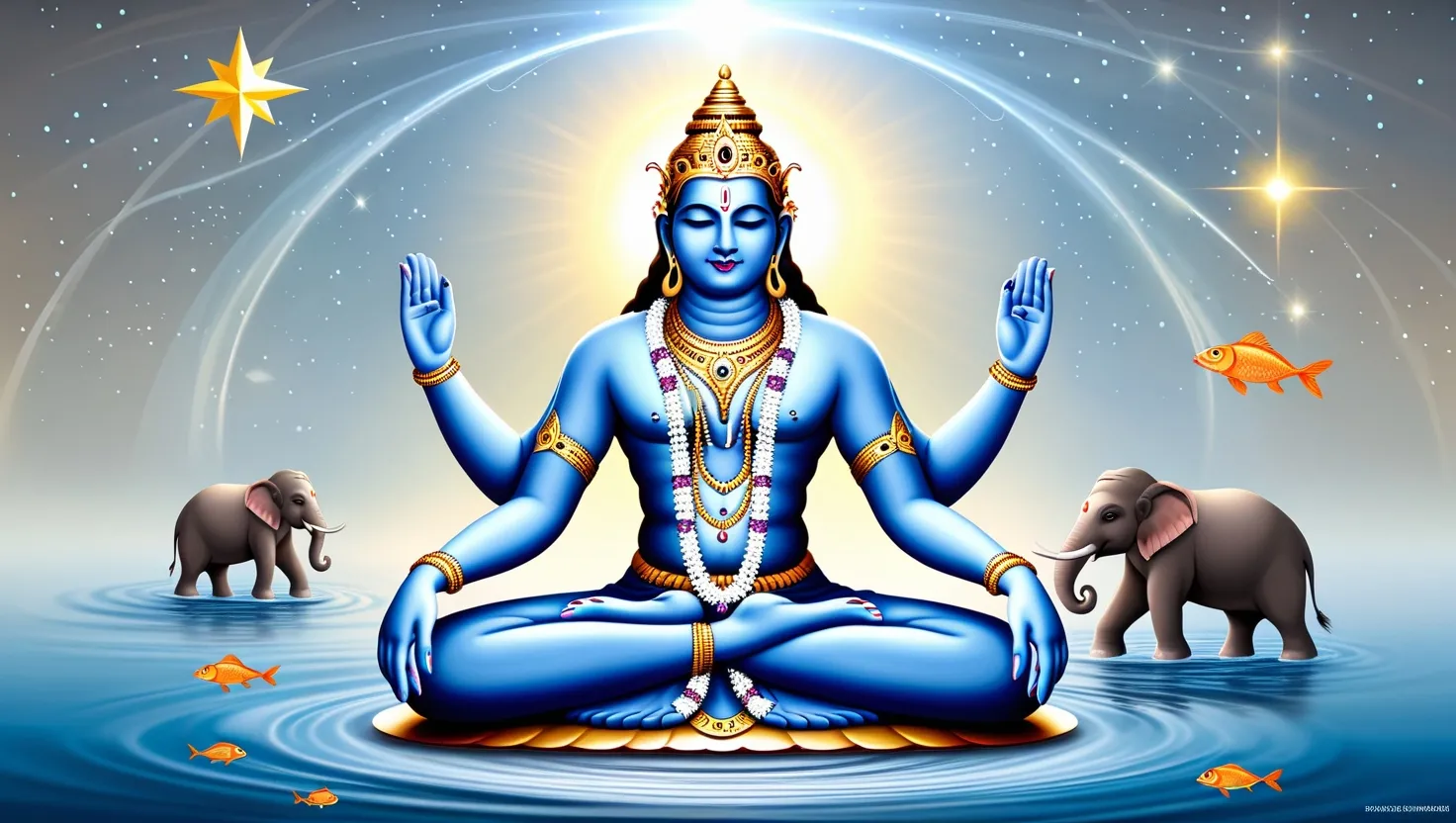What strikes me most about the Vishnu Purana is how stories that seem vast in cosmic scale can ripple into the small, daily choices I make. Reading through its pages, I don’t simply encounter abstract virtues or distant gods — I find stories that echo in the everyday, tales that illuminate my choices each morning, how I respond to adversity, and what kind of person I strive to become. Let’s talk, you and I, about seven qualities that emerge so strongly from these ancient narratives, yet feel as relevant as ever in our ordinary lives.
Let’s start with Dhruva—a figure who reminds me that determination finds its own path, no matter the starting point. As a child overlooked by his own father, Dhruva’s single-minded longing drew him to severe penance. To imagine a young boy, braving forests and cold, resolute in purpose, is to remember how powerful a focused heart can be. I think of him when I’m tempted to give up after the second or third setback, or when doubts about my abilities crowd in. Dhruva’s story assures me: it’s not about where you begin—it’s that you begin, and persist. The Pole Star, forever fixed in the sky, stands as a celestial reminder of what steady purpose can achieve.
“Start where you are. Use what you have. Do what you can.” — Arthur Ashe
But determination doesn’t live only in heroic acts. Sometimes, it’s the small, repeated kindness that counts, like the story of Manu. He offered a cup of water daily to a tiny fish, and that simple habit changed the tide of the world. The fish—really Vishnu in disguise—grew and grew, eventually saving Manu and all living creatures from a devastating flood. What speaks to me here isn’t just the grandeur of the rescue; it’s the humility of the act that started it. How many times do we overlook the impact of a smile to a colleague, a helping hand to a neighbor, or a daily phone call to someone who may feel alone? What rivers form from our drops of kindness over time? If a small gesture, done faithfully, can shape destinies in the Purana, what’s stopping me from shaping my own community with the same steady care?
“Act as if what you do makes a difference. It does.” — William James
Then there’s Gajendra, the elephant king, caught by the crocodile. He fought with his formidable strength until exhaustion left him helpless. Only then did he lift his trunk, not just in defeat, but in a deeper surrender, calling out to Vishnu. That scene runs through my mind in moments when I’m convinced I must manage crises alone, when stubbornness feels like the only way through. It’s humbling and oddly comforting to remember: sometimes, the most honest strength is in knowing when to ask for help, to drop the pretense of total control. Isn’t there a kind of relief in admitting, “I can’t do this alone”? Whether our “crocodiles” are career setbacks, personal loss, or inner turmoil, the teaching that help finds us when we truly let go is powerful.
“Sometimes letting things go is an act of far greater power than defending or hanging on.” — Eckhart Tolle
Prithu’s narrative shifts focus to stewardship. Unlike kings who sought only glory, Prithu took on the task of extracting nourishment from a withholding earth, not for himself, but for his starving people. His leadership wasn’t defined by authority, but by responsibility—he saw his power as a tool to serve. For your own life, what does leadership look like? Am I using what I have—my talents, resources, relationships—to nurture others, or simply to accumulate? Prithu’s story suggests that real authority is less about commanding and more about tending; that when you care for something—a family, a garden, a business—with intention, it flourishes for everyone.
“Leadership is not about being in charge. It is about taking care of those in your charge.” — Simon Sinek
Rivaling Prithu’s humility is the cautionary tale of Hiranyakashipu. Granted extraordinary powers, he grew so arrogant that he believed himself beyond the reach of death or justice. Yet, in the gap between “almost” and “absolutely” lies the subtle logic of the cosmos; Vishnu, as Narasimha, appeared in a form and moment that bypassed every supposed safeguard. To me, this isn’t some ancient karmic boomerang — it’s a mirror for the times when pride makes me forget my own limitations, when confidence quietly slips into hubris. The fate of Hiranyakashipu is a sharp reminder: no matter the victories gathered or clever moves made, humility is wiser than certainty.
“It is better to conquer yourself than to win a thousand battles.” — Buddha
Bali’s fall from grace, when he tried to gain dominion over all worlds, is another lesson worth pausing for. Vamana’s polite request—just three paces of land—exposes how unchecked ambition can lead to an inevitable reckoning. The first two steps covered everything Bali owned, the last step pressed gently on his head, sending him to realms below. Is ambition itself a problem? Hardly. But without limits, without a sense of contentment, even virtues sour. When I feel the pressure to stretch endlessly, to consume or conquer, I’m reminded of the necessity to ask myself: when is enough, enough? What would happen to our world if more of us chose contentment over endless grabbing?
“He who is not contented with what he has, would not be contented with what he would like to have.” — Socrates
If we return again to the overlooked, we find Suniti—Dhruva’s mother—modeling a wisdom and patience that rarely gets noticed. Faced with the harshness of palace politics and her son’s heartbreak, Suniti’s guidance came without resentment. She didn’t revolt, didn’t poison Dhruva’s mind. Instead, her faith and steady encouragement shaped a king out of a grieving child. Have you ever known someone whose dignity under pressure, whose calm wisdom in chaos, changed everything for the better? When circumstances bruise us and words wound, what power lies in gentle perseverance? This is the quiet resilience that sustains not just families, but entire generations.
“Patience is bitter, but its fruit is sweet.” — Aristotle
When I reflect on these seven values—focused purpose, small kindnesses, surrender, responsible care, humility, healthy boundaries, quiet resilience—I’m struck by their ordinariness. They don’t require lofty philosophies or dramatic gestures. Each is woven into the fabric of daily life, present in school runs and boardrooms, start-up struggles and moments of despair. That’s the magic of these ancient tales—they don’t demand perfection, only that we remember.
This brings me to a question for both of us: where do these values show up in your life? Is there a moment when you chose kindness over convenience? When was the last time you asked for help, or drew a much-needed boundary? Are you leading with care, or only with authority? Whose faith and patience shaped your character, and do you honor that by showing the same to others?
It’s common to treat the Vishnu Purana as a window into myth, but I see it more as a mirror, reflecting possibilities in my own choices. Each narrative, beyond its dazzling cosmic play, asks for one act: to translate story into practice. Perhaps the greatest wisdom lies not in understanding the intricacies of divine avatars, but in choosing, again and again, to live with intention—a little more like Dhruva, a little less like Hiranyakashipu, and, whenever possible, to offer a helping hand, even to the smallest of fish.
“Stories are light. Light is precious in a world so dark.” — Kate DiCamillo
So, as you read these tales and consider these values, ask yourself: which story will you live out today? Will it be one of steady resolve, patient kindness, open surrender, mindful stewardship, grounded humility, respectful restraint, or unwavering faith? The choice is yours, every single day.






